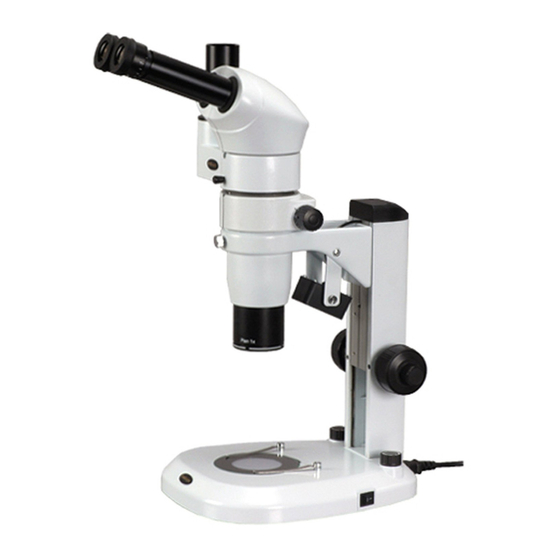AmScope PM200 Series Manuale d'uso - Pagina 9
Sfoglia online o scarica il pdf Manuale d'uso per Microscope AmScope PM200 Series. AmScope PM200 Series 16.

PM200 Series
Setting Up
1. Once you have placed your sample on the table or base below the objective, center the sample as best as possible.
A slide is neither needed nor required for a stereo microscope, although they can be used if desired. If using a slide,
use the stage clips to hold it in place.
2. With both eyes open, look into the eyepieces. Adjust the interpupillary distance by holding the eyepiece tubes
and rotating the eyepiece tubes either towards or away from each other until only one circle of light is seen by both
eyes.
3. Adjust the magnification knob to the lowest setting (0.7) and move the microscope's focusing knobs (on the
focusing rack) to adjust the height of the unit until at approximately 4 inches (101mm) away from the sample. If
not clear after adjusting, please be sure that you have not installed any additional Barlow lenses onto the objective.
4. Center the object in the field of view once you have achieved focus.
Focusing
1. A stereo microscope's focus differs from a compound microscope. Magnification and focal distance (working
distance) are inversely related to each other. The more magnified one is, the lower the distance between the objec-
tive and the sample to achieve focus.
2. When first using the microscope, remove all Barlow lenses and set the magnification knob (on the microscope
head) to the minimum setting (0.8x).
3. Begin focusing the microscope by moving the knob until the head is about 4 inches (101mm) away from the
sample. This should bring the microscope in focus at 8x.
4. If you' d like to use greater magnification than the minimum setting, you will need to move the microscope head
closer to the sample as well as adjust the magnification knob to a higher setting. The more magnified, the closer
you need to be.
5. This unit is a common main objective (CMO) microscope, so the optical quality through the trinocular port
and eyepieces will be better, however the image will appear more flat than your typical Greenough design stereo
microscope. The trinocular port when using a camera will appear to have more focus than the Greenough variants
due to the single objective design (rather than the dual offset design of a Greenough).
9
